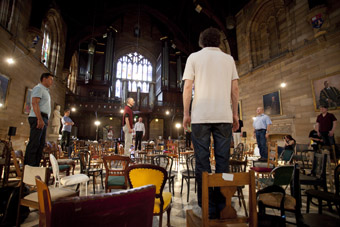beauty disturbed
david williams: ruhe, sydney festival

Ruhe, Muziektheater Transparant,
photo Jamie Williams
Ruhe, Muziektheater Transparant,
ON ENTERING SYDNEY UNIVERSITY’S GREAT HALL, I AM FACED WITH A MULTITUDE OF TIGHTLY PACKED MISMATCHED CHAIRS FILLING THE SPACE. WATCHED BY PORTRAITS OF PAST CHANCELLORS, I NEGOTIATE MY WAY AMONGST OTHER AUDIENCE MEMBERS.
As the last stragglers are seated, an ordinary-looking man in front of me stands on his chair, joined by another eight men. They are the renowned choir Collegium Vocale Gent and sing, in glorious a cappella harmony, a selection of songs by Franz Schubert. The title of the performance comes from their third song, “Ruhe, schoenstes Gluck der Erde” (Rest/calm/silence, earth’s sweetest joy).
The setting is perfect for a recital, and the singers are divine. But nothing in Ruhe is as simple as it appears. From within the huddled mass of audience, a woman stands and begins speaking, cutting off the choir mid-song. She speaks of her experiences as a paid-up member of the National Socialist Party working as a nurse in an SS hospital in occupied Holland. In her reminiscences she’s enthusiastic and bubbly, awestruck by the brave injured men for whom she cared. Despite the grimness of the hospital’s speciality—amputations and rehabilitation for those with artificial limbs—hers is a great adventure. “I realised how useful I was… I was doing something that really, really mattered.” She remembers gushing upon seeing Himmler for the first time. He was, in her opinion, very nice. Much later, in a crowded train with the rest of the hospital fleeing the Allied advance, she remembers hearing of Hitler’s death on the radio, and weeping.
As her story concludes, the choir begins to sing again, as if their beauty might relieve the disquieting memories of this apparently nice young woman. Soon after however, a man stands in the audience interrupting their song. “The thing I liked about National Socialism,” he declares, “was the socialism.” He wasn’t so interested in the nationalism, which perhaps made sense, given that he was a Dutch member of a German party. “A minority should never have more than their rightful share,” he states in a reasonable and mild tone. He’s much easier to dislike than the woman, clearly an adherent to an ugly ideology, and yet his words have an uncomfortable plausibility. I’ve heard words like these before, from Australian mouths.
The texts are drawn from Armando and Hans Sleutelaar’s book De SS’ers, a series of interviews in the 1960s with Dutch members of the SS during Word War 2. In the program notes, Tom Jansen, who adapted the text with director Josse De Pauw, suggests that the performance is motivated not by a political agenda, but rather by the “gripping confusion raised by the material.” But in the face of this testimony, it’s difficult to avoid thinking about nationalist political movements, past and present. These are familiar exclusionary politics, complete with ugly moral equivalences, and active blindspots.
“You’ve got a nerve bringing this up,” the man declares when the reality of the gas chambers threatens his rational anti-Semitic ontology. He agrees that, “gassing people is not a decent thing to do.” But he’s equivocal. “It’s a better way to die than firebombing,” he states, expressing outrage about the Allied destruction of German cities, embracing the grisly algebra of ‘better’ deaths. Who is this audience to judge him? “You’re not such nice guys yourself.”
Neither of the speakers repudiates past actions. The man even describes himself as “an idealist”, adding helpfully that it might be best for all idealists to be lined up and shot. The woman suggests that she was simply doing her duty in a struggle against communism. “Why,” she asks, “is it okay to fight Communism now and it wasn’t back then?” It’s an awkward, if self-deceptive question. By placing this testimony alongside angelic singing, Ruhe masterfully interweaves beauty and what Hannah Arendt has described as “the banality of evil,” an evil uncomfortably close to home.
Finished with Schubert, the choir move to a raised platform at the far end of the hall, from which they begin another Ruhe, composed by Annelies Van Parys. Beside them is a projected monochrome image, a pastoral scene dominated by a huge tree with two farmers standing in front of a windmill. The tree’s leaves rustle gently in a breeze, but the human world within the image remains frozen. It’s a magnificently unresolvable image with which to end a gentle, beautiful, and deeply disturbing performance experience.
–
Sydney Festival, Muziektheater Transparant, Ruhe, conceived and directed by Josse De Pauw, text Armando, Hans Sleutelaar, text adaptatio Tom Jansen, Josse De Pauw, music Franz Schubert, Annelies Van Parys; music selection Jens Van Durme, set, lighting design Herman Sorgeloos, performers: Han Kerckhoffs, Truus te Selle, singers: Collegium Vocale Gent; Great Hall, Sydney University. Jan 25-29
RealTime issue #95 Feb-March 2010 pg. 16






